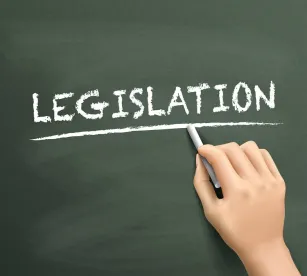President Donald Trump effectively stopped the Consumer Financial Protection Bureau’s (CFPB) so-called “arbitration rule,” signing legislation repealing the rule on Nov. 1. The rule would have prohibited providers of certain consumer financial products and services from requiring arbitration of any future dispute to bar a consumer from filing or participating in a class-action lawsuit.
The House of Representatives used the Congressional Review Act to initiate repeal of the rule in July, which would have gone into effect on Sept. 18. The Senate joined in with the House when it voted in favor of the repeal on Oct. 24 (the tie vote broken by Vice President Pence). However, repeal of the arbitration rule may not provide finality on the matter of class-action waivers and arbitration clauses in the financial services industry. Indeed, large and influential states such as California have started their own push for a greater role in the regulation of consumer financial services and other regulators may use their more limited, but still significant authority to implement reform via enforcement actions. Thus, providers of consumer financial services will have to remain vigilant of developments in this area to avoid having their consumer contracts invalidated or challenged via enforcement actions.
Congress created the CFPB in the Dodd-Frank Wall Street Reform and Consumer Protection Act in July 2010. Since its inception, the CFPB has been controversial and litigation challenging its constitutionality remains pending in the federal courts. Among the most widely publicized – and controversial – actions of the CFPB was the promulgation of the arbitration rule. Rumors about the rule had swirled for years, but the CFPB didn’t propose it until May 2016, after conducting a study on the effects of arbitration on the consumer financial industry and delivering a report to Congress in 2015. The rule became final in July 2017, but would not have gone into effect until 60 days later.
The arbitration rule did not ban pre-dispute arbitration clauses outright, but merely pre-dispute arbitration clauses that prohibited a consumer from filing or participating in a class-action lawsuit. While the rule put forth by the CFPB was less restrictive than some were expecting, it still faced considerable industry and legislative opposition.Consumer advocates asserted the rule was necessary to permit consumers access to the justice system, but lawmakers and industry advocates asserted the rule would result in increased costs for consumer financial service providers, which would ultimately be passed on to consumers. Given the timing of the arbitration rule and Trump’s election, opponents in Congress were able to use the Congressional Review Act to legislatively repeal the administrative action of the CFPB.
Repeal of the arbitration rule essentially affirmed what the U.S. Supreme Court has been saying in recent decisions on the topic, (i.e., that pre-dispute arbitration contracts, which prohibit class-action litigation, are enforceable). And on the surface, the issue appears settled as a matter of federal law, but financial services firms should not consider the issue closed. For example, California recently enacted Senate Bill 33, which prohibits banks, credit unions, and investment advisors from requiring arbitration if those banks, etc. are alleged to have created fraudulent accounts. The legislation is likely to face judicial challenges from the financial services industry. Senate Bill 33 is narrower than the CFPB’s arbitration rule in that the California legislation applies only to claims arising out of fraudulent or illegal activities, but the bill provides a perfect example of the ways in which populous states may take up the consumer protection mantle.
Thus, notwithstanding the apparent end of the CFPB arbitration rule, providers of consumer financial services must stay aware of the constantly evolving state regulatory climate. Failure to adhere to state laws and regulations in the field of pre-dispute arbitration agreements may lead to the invalidation of contractual clauses and the prospect of class litigation regardless of the existence of a pre-dispute class-action waiver or arbitration clause.




 />i
/>i

